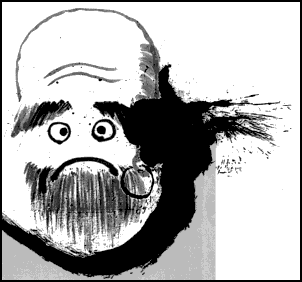Your Heart Will Break
Field Notes from
A Zen Life
James Ishmael Ford
(Wisdom)

- You don't get it [the Meaning of Life, the Truth, the Enlightening Message;]
- You never will get it [the Meaning of Life just doesn't lie back and reveal itself;]
- So stop trying already.
Or as Ford writes, as a chapter head: Only Don't Know.
It might be untrue that Ford is trying to define his brand of Zen in two hundred pages, for this particular religion is not so pointed. Much of the book tells of his own path, of his family, of his reading of what others have had to say about Eastern religions, of going to San Francisco seeking a master, of his experience with sitting, and the discovery of a life-changing passage he found when he was seventeen. He was reading the biography of the exotic Hindu master Ramakrishna. Ramakrishna had a vision of the goddess Kali: "[She] emerged from a river, swollen with pregnancy, gave birth to a child, and then ate it.
- I read this and it took my breath away. I was repulsed and at the very same time felt somewhere deep inside me that this was a spiritual pointing to someone more profound.
Ford has seven key steps that he offers here for the student, rules for what might be called holy survival:
- Don't cut yourself off from the world. ("Here we discover ourselves walking the divine way.")
- Do not kill.
- Do not lie.
- Do not steal.
- Do not misuse sex.
- Do not forget your family.
- Do not drink the wine of delusion.
Ford quotes Kitaro Nishida to the effect that we start off with an essential unity, and as we survive and grow, we change that unity into a division between the "knower and known" ... which ultimately resolves itself within us into a being that moves towards unity again.
If you think this is all quite mysterious, you are right. The writer has been a student of Soto Zen for over forty years. This means years of study, meditation, instruction from the masters, and finally the realization that the key is ... [ready?] not knowing. To attain this not-knowing, each of us has to follow "our own trajectory, each with our own moments, and all joined."
- For me [he relates] I found it in a Buddhist monastery, eating a thin cabbage soup. For you, perhaps playing with a child. For another, perhaps listening to Mozart ... The secret is not knowing.
Only don't know.
Ford has a way with words. His definition of karma and rebirth are sound. "Karma is the observation that everything has causes and everything has consequences; rebirth is the observation that I am constantly being created and recreated by each succeeding moment."
There are some famous koans, those puzzles that Zen thrives on, puzzles that have no solution interwoven into the text here: Does a dog have the Buddha nature? What is the sound of the one hand clapping. My favorite, Alan Watts' favorite, is missing:
- Q: What is the most important thing in the world?
A: The head of a dead cat.
Some the stories go over my head, but the essence of If You're Lucky is that the writer is a man who, quite possibly, has got it. Maybe yes, maybe no. Because if you think you've got it, you are wrong. That is, until you give up.
Then, of course, you might have it. But then again, maybe not.